On December 27, the South Korean National Assembly passed a bill calling for the impeachment of South Korean Prime Minister Han Duck-soo, who is also the acting president of the country. It is the first impeachment of an acting president in South Korea’s history. As of 5:19 p.m. KST, Han has been suspended from his duties.
The bill to impeach Han passed with 192 votes.
Due to Han’s position as the acting president, the ruling People Power Party (PPP) stated that the measure needed 200 votes, applying the same requirement necessary for impeaching the president of South Korea. However, as the bill was tabled to impeach the “prime minister,” Woo Won-shik, the Speaker of the National Assembly, proceeded with the vote and concluded the quorum for the impeachment of Han as 151 votes.
Under the South Korean Constitution, the National Assembly can impeach cabinet members including the prime minister with more than 150 of 300 lawmakers’ votes. Only the impeachment of the president needs two-thirds of the assembly’s 300 votes.
The PPP lawmakers vehemently condemned Woo’s decision, protesting in front of Woo’s seat in the plenary chamber. Then most of them left the chamber in an act of protest against Woo and the main opposition Democratic Party’s motion to impeach Han, as the DP itself could pass the bill with its own 170 lawmakers.
Days after the National Assembly impeached South Korean President Yoon Suk-yeol on December 14, Lee Jae-myung, the DP’s leader, said his party would not impeach Han in order to stabilize the country’s economy and system. Although some DP lawmakers called Han an “accomplice” in Yoon’s alleged insurrection as he attended the cabinet meeting called by Yoon on December 3 before he declared martial law, the opposition had not made moves to impeach the remaining cabinet members who were accused of cooperating with Yoon’s illegitimate declaration of martial law.
However, the cooperation between the government led by Han and the National Assembly controlled by the DP came to an end only 13 days after Han took up the acting presidency.
Han made an address regarding his decision not to appoint three judges for the Constitutional Court who had been nominated by the National Assembly on December 26. In response, the main opposition Democratic Party swiftly engaged in the impeachment process. Han said he would reserve appointments of judges until the ruling PPP and the opposition parties reached a consensus. This argument was unacceptable for the DP as one of the three judges appointed by the National Assembly was nominated by the PPP, meaning the National Assembly appointed them through an agreement made by the PPP and the DP weeks ago.
“Today, the Democratic Party impeaches Han in accordance with the people’s order,” Lee, the leader of the DP, said in his statement hours before the National Assembly impeached Han on December 27.
Lee called his party’s motion to impeach Han as a follow-up to what people demanded. He also said he would quell the insurrection forces which are still trying to destabilize the country in the wake of Yoon’s martial law. Calling Yoon a ringleader of insurrection, Lee said Yoon and his followers are the biggest threat to South Korea.
Han’s explanation of reserving appointments seemed uncompelling as the three judges for the Constitutional Court should be appointed by the National Assembly under the Constitution. The president’s approval of these appointments is simply a formality, but Han refused to do so due to pressure from the PPP.
For the PPP, there is the possibility of Yoon returning to office, if his impeachment fails in the Constitutional Court. At present, without the appointment of three additional judges to fully seat the court, the only scenario for the Constitutional Court to uphold Yoon’s impeachment is a unanimous agreement by all six sitting judges. As there is one judge who had been appointed by Yoon in the Constitutional Court, the PPP seems to expect him to stand against the other judges in Yoon’s impeachment trial.
However, if three more judges fill the existing vacancies, Yoon can be impeached by two-thirds of approval, as the constitution requires six judges’ approval to impeach the president. In this context, the PPP and the DP have actively explained their reasons why Han should or should not appoint the three judges since the National Assembly passed a bill calling for impeaching Yoon on December 14.
The Constitutional Court and the Supreme Court have made clear that the acting president can approve the appointments of the three judges made by the National Assembly. With this, Woo, the speaker of the National Assembly, repeatedly emphasized that it is the responsibility of the National Assembly, not the president nor the Supreme Court, to fill the three vacancies in the Constitutional Court. Demanding Han approve the appointments immediately, Woo also reiterated that this is not a political issue. However, Han made a decision that could be deemed by the public as stemming from his loyalty to Yoon and an attempt to ensure Yoon returned to office.
The Constitutional Court held a first preparatory hearing for Yoon’s impeachment case on December 27. It said it would proceed with the trial swiftly and scheduled January 3 as the date for the next hearing.
According to the Constitutional Court, it is in discussion whether to proceed with the impeachment trial of Yoon with only six judges if the acting president does not approve the appointments of the National Assembly. It is far from ideal for the court to rule on such an important issue with only six judges when the Constitution requires it to have nine judges.
Choi Sang-mok, deputy prime minister and Minister of Economy and Finance is now the acting president of South Korea. Should he refuse to approve the appointment of judges, he could also be impeached by the DP-controlled National Assembly.































